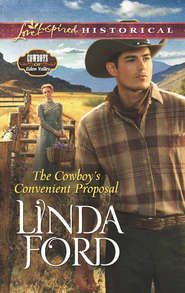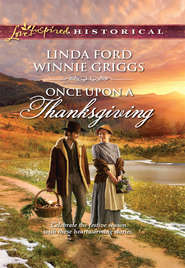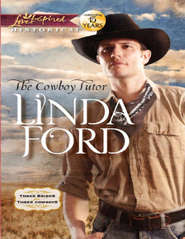По всем вопросам обращайтесь на: info@litportal.ru
(©) 2003-2025.
✖
The Road to Love
Настройки чтения
Размер шрифта
Высота строк
Поля
Kate hovered at the doorway, breathing in the pleasure of her farm. “Where are you from, Mr. Jones?”
“From nowhere. Going nowhere.” He seemed preoccupied with the bowl of food.
“You must have belonged somewhere at some time.” The idea of being homeless, having no roots still made her tense up inside. She couldn’t stand the thought of someone out there, hunkered over a lonely campfire. Cold, wet, miserable, vulnerable to prying eyes. It was a too-familiar sensation she couldn’t shake. Not even after all these years.
He shrugged. “Too long ago to matter.”
“Going anywhere in particular? I hear a lot of men are heading toward the coast.” She chuckled. “At least it rains there.”
“Been there. Seems all it did was rain.”
“So you didn’t like it?”
Again he shrugged, a languid one-shoulder-higher-than-the-other gesture that said better than any words that he was short on opinions about such things. “Can get too much of even a good thing.”
“You surely can’t like this drought better’n rain. Even too much rain.”
“Drought or rain. What’s the difference? Man just has to make the best of it.”
“A woman does, too.”
He glanced over his shoulder to her. “It’s not easy.”
“No. It’s not. But we do okay.”
He nodded and looked across the fields. “How much land you got here?”
“Two quarters.”
“How much in crop?”
“A hundred acres.”
He grunted. “Planning to put it all down to wheat?”
How long had it been since anyone had asked her about her farm? Doyle’s only question was when did she intend to get rid of it and marry him? Her answer was always the same. Never. This farm belonged to her. Lock, stock and piles of dust. She would never let it go or even take out a mortgage on it.
Even Sally, dear friend that she was, couldn’t understand Kate’s dedication to the land. All Sally could think was how fortunate Kate was to have a beau such as Doyle. Handsome, debonair, well-off, a lawyer with a big house. “You could quit working like a man,” Sally said often enough.
Kate drew in a long breath full of spring sweetness. The smell of new growth. Who’d believe green had its own scent? She’d once tried to explain it to Doyle and he’d laughed. Unfortunately the endless dust drowned out all but tantalizing hints of the freshness. So far this spring there hadn’t been any blinding dust storms but no significant amounts of rain, either. What was the official total? .06 inches. Hardly worth counting.
She gathered up her shapeless plans for the spring work and put words to them. “I want to put in some corn. Seems to me it’s pretty hardy once it’s tall enough the gophers don’t eat it off.”
“No problem with blackbirds attacking it?”
“Some. But there’s a bonus to that. They’re good eating. ‘Four and twenty blackbirds baked in a pie.’”
He straightened his shoulders inside his worn blue shirt, hesitated as if to consider her words and then grunted in what she took for amusement. “God’s blessings often come disguised.”
She stared at his back, saw his backbone edging at the faded blue of his shirt. A hobo who talked about God? Even more, about God’s blessings. She couldn’t keep herself from asking, “What blessing is disguised in being homeless?” She could recall none.
He lifted his head and looked out across the field. She wondered what he saw. Did the open road pull at him the way it had her father?
“There are certain advantages.” He spoke softly, with what she could only guess was a degree of gratitude.
She rubbed at a spot below her left ear where her jaw had knotted painfully and tried not to remember how she’d hated the constant moving, the never knowing where home was or where they would sleep. Every time they settled, even knowing it was temporary, she hoped this would be the last time they moved. There was no last time for her father, still restlessly on the move. But a time came when Kate refused to move on. She felt no call to wander. No appeal of the long winding road.
Hatcher Jones considered her. “A hundred acres to seed this spring? Quite a job. You got a tractor by any chance?”
She gladly pulled her thoughts back to the farm—her home, her security. “I got me a tractor.” She’d managed to limp it through last year with the help of the oldest Oliver boy whose ability and patience coaxed it to run. But since Abby Oliver headed north, she had no one to help her. “It needs a few repairs.” She almost snorted. A few repairs. It was as pathetic as measuring .06 inches of precipitation and calling it rain.
Hatcher pushed to his feet. “I’ll be moving on. Again, thank you for the meal.”
“You’re welcome. Thank you for taking care of the windmill.” The rotary wheel hummed quietly on the tower. No more protesting squeal of dry gears. Another month before she’d have to brave the heights again.
Hatcher stood with his hat in his hand, looking as though he had something more he wanted to say. Then he jammed the blackened hat on his head and nodded. “Good food. Thank you.”
Kate laughed. “Does that mean you won’t post a secret sign at the end of the lane warning hobos away?”
She couldn’t see his eyes, hidden under the shadow of his hat, but his mouth flashed a quick smile.
“No, ma’am. But I won’t be letting others know how good a cook you are, either. Wouldn’t want a whole stream of hungry men descending on you.” He gave a quick nod.
“Now I’ll leave you in peace. God bless.”
She watched him stride away, his long gait eating up the road in deceptive laziness and suddenly, she felt lonely. She thought of calling him back. She wanted to talk more about the farm. Ask him what he’d seen in his travels. How severe was the drought in other places? Did he really see God’s blessing in the hardships he witnessed and experienced? She sighed deeply, pushing her useless longings out as she exhaled. Then she returned to the many chores still waiting.
She strained the milk and separated it.
“Mary, hurry out and shut in the chickens. Take out these peelings.” She handed her the basin and ignored Mary’s wide-eyed silent protest. “We can’t afford to lose any of them.” The child had to get over her unreasonable fear of chickens. “Dougie, go put the heifers into the corrals and make sure the gate’s tightly latched.” He was really too small to chase after the animals but she couldn’t be everywhere at once. “Hurry now before it gets dark.” She’d run out and help Dougie as soon as she finished the milk. And if the past was any indication, she’d end up dumping the basin of peelings. Mary never seemed to get any farther than the fence where she tried to poke the contents through the wire holes.
Kate prayed as she worked. God, protect the children. Help Mary realize she’s bigger than the chickens. Help me find a way to get my crop in. She stilled her thoughts. As usual, her prayers seemed an endless list of requests. But she had nowhere to turn but to God who promised to provide all her needs. Seemed to her a God who owned the cattle on a thousand hills and held the waters in His hand could send a little rain to her area of the world. Lord, help me be patient. I know You will provide for us. You’ve promised. A smile curved her lips. Thank You that I didn’t have to grease the windmill. A blessing in the form of a hobo. God must surely have a sense of humor.
She scoured the milk buckets and turned them upside down to dry, poured boiling water through the separator and cleaned it thoroughly.
Normally the work kept her mind adequately occupied but not tonight. One hundred acres to seed. A tractor that refused to run. And no help. She needed a hired man. One with experience. One with the ability to fix the tractor. One who didn’t expect anything more than his keep. She knew no such person. She’d run an ad in a few papers but the responses were disappointing at best and downright frightening in the case of one man who made very inappropriate suggestions. Of course, as Doyle always pointed out, she had the option of selling the farm and accepting his offer of marriage.
As she dashed to the barn to help Dougie, pausing at the chicken yard to take the basin from Mary and toss the peelings into the pen, she wondered if she was being stupid or stubborn to cling to this piece of property. Probably both, she willingly admitted, but she wasn’t ready to give up the only permanent home she’d ever known.
The sun sat low on the western horizon brushing the sky with purple and orange and a hundred shades of pink. At the doorstep, she turned, holding a child’s hand in each of hers. As she drank in the beauty of the sunset she silently renewed the promise she’d made to herself after Jeremiah’s death. Never would her children know the uncertainty of being homeless. Not if she had to pull the plough herself.
Chapter Two
Hatcher watched the blades on the Bradshaw’s windmill turn smoothly as he headed down the road toward a nearby farm where he heard a man could get a bit job. All he needed was enough work to fill his stomach and a chance to bathe and wash his clothes before he moved on. He prided himself on a fair amount of work in exchange for a handout. Seems the meal Mrs. Bradshaw provided was more generous than the work he’d done. He’d have to fix that somehow.
As he shoveled manure out of the barn for a Mr. Briggs, he tied a red neckerchief over his nose and kept his mind occupied with other things than the pungent, eye-watering smell of a long-neglected job. Most men would be ashamed to let even a hobo bear witness to such slovenliness. Not that it was the worst job he’d ever done. Good honest work never hurt anyone. Long ago, he’d learned he could enjoy his thoughts as he worked at even the most unappealing job; his favorite way was to see how many Bible verses he could recall without stumbling. In the ten years he’d been wandering the back roads of this huge country, he’d committed hundreds to memory. From the first day the words from Genesis chapter four, verse seven haunted his thoughts. If thou does well, shalt thou not be accepted? And if thou doest not well, sin lieth at the door.
He’d sought comfort and absolution in the scriptures. He’d memorized the first nine chapters of Genesis, saw over and over the failure of man to live as God intended. A fact that surprised him not at all.











